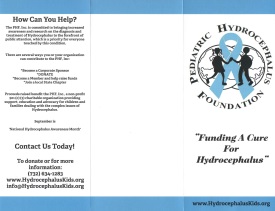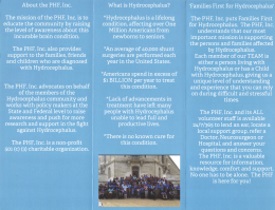Fairfield Couple Co-Hosts ZenRide Benefit To Honor Their Little Girl
October 21, 2017 by PHF
Filed under Uncategorized
Comments Off on Fairfield Couple Co-Hosts ZenRide Benefit To Honor Their Little Girl
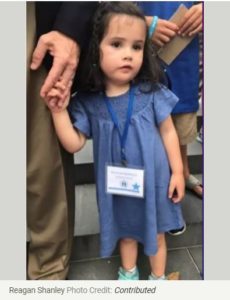 FAIRFIELD, Conn. — ZenRide Spinning Studio and Fairfield residents Cindy and Tim Shanley on Oct. 22 will present the 3rd annual “Biker-Barre” to help fund a cure for hydrocephalus, a brain condition the Shanleys’ little girl lives with every day.
FAIRFIELD, Conn. — ZenRide Spinning Studio and Fairfield residents Cindy and Tim Shanley on Oct. 22 will present the 3rd annual “Biker-Barre” to help fund a cure for hydrocephalus, a brain condition the Shanleys’ little girl lives with every day.
Located at 869 Post Road, ZenRide will offer a spinning and Bar Method combo class at 3 p.m. After that, participants can stay on for refreshments and a silent auction to benefit the cause.
All proceeds will go to the all-volunteer Pediatric Hydrocephalus Foundation.
The Shanleys support the effort to honor their daughter, Reagan — “Rae Rae” to her friends and family — who has hydrocephalus, and to raise both awareness and research dollars.
The last two Biker-Barre events have raised almost $20,000 each.
The event’s success allowed the Shanleys to create the Reagan Sloane Shanley Scholarship for applicants interested in neuroscience and/or engineering who have a special interest in better understanding hydrocephalus, cerebral spinal fluid and the brain.
A $40 donation reserves a bike for the spinning class.
To register, visit zen-ride.com/reserve.
To make a donation, visit active.com/donate/phfzenride2017.
To learn more about hydrocephalus, visit www.HydrocephalusKids.org.
Source: 
As she battles brain disease, Isabella Sacharczyk is on a mission to help others
October 18, 2017 by PHF
Filed under Uncategorized
Comments Off on As she battles brain disease, Isabella Sacharczyk is on a mission to help others
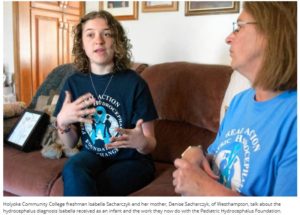
WESTHAMPTON MA — “Water on the brain.”
These are the words that echoed in Denise Sacharczyk’s mind on one of the worst days of her life.
A doctor called to tell her that her newborn daughter, Isabella, had hydrocephalus, the buildup of fluid in the brain. The 2-month-old had fought for her life from bacterial meningitis and wasn’t expected to live. The infection led to a stroke, which led to the fluid. A deadly amount of pressure has risen inside the child’s skull.
Isabella was rushed by ambulance to Boston for brain surgery, leaving her mother and father, Kenneth, distraught. Doctors said she would never talk or walk. They questioned whether she would ever see or hear.
“They told us that we should probably think about putting her in a home for kids like her,” says Sacharczyk. “We chose not to do that, naturally.”
That was 19 years ago and Isabella Sacharczyk is still here. A freshman at Holyoke Community College, she lives with her family in Westhampton. She also lives with hydrocephalus which never went away. She has undergone 23 brains surgeries, so far, but there is no cure. The fluid is not exactly water, but more like a saline, that collects around the brain. It creates constant pain in her head.
“She has lived such a life of pain, even just trying to go to school can be really hard,” says her mother.
Isabella Sacharczyk looks like an ordinary teenage girl, petite with wavy brown hair down to her shoulders. She has exceeded all expectations. She not only walks and talks, she plans to pursue a doctorate in computational biology after she completes her undergraduate studies in computer science. One day she hopes to work alongside researchers in the laboratory at Boston Children’s Hospital to help find a cure for hydrocephalus. In the meantime, she and her mother hold regular fundraisers in conjunction with the Pediatric Hydrocephalus Foundation, an organization based in New Jersey to advance research for children; they have a crafts fair scheduled for Saturday at Eastworks in Easthampton (See box below).
“I’ve made it my mission to hopefully be part of the team that cures hydrocephalus or finds better treatment,” Isabella says.
A lifetime of misery
Hydrocephalus affects more than 1 million Americans in every stage of life, from infants to the elderly. One to two of every 1,000 babies are born with it, making it as common as Down’s syndrome, according the the Hydrocephalus Association, an organization based in Maryland.
“There are approximately a hundred reasons why someone might develop the condition,” says Dr. Thomas Kaye, Chief of Neurosurgery at Baystate Medical Center in Springfield. It most often affects people at the end or beginning of life, coinciding with conditions like birth trauma or dementia.
Most healthy people’s brains produce two cups of fluid every day that is then absorbed back into the body. When the natural absorption process goes haywire, the typical treatment is surgery to implant a mechanical system including a valve and tubing inside the brain to drain fluid to another part of the body, often to the lining around the stomach or the lungs. But it’s not uncommon for these systems to fail, says Kaye.
“The (tubing) that they put in is basically a Band-Aid — it’s a mechanical device that has the highest failure rate of all mechanical devices put into a body,” Denise Sacharczyk says.
Isabella has spent a large percentage of her young life in hospital beds. She’s had thousands of MRIs and CT scans. Sometimes the tubing that drains fluid into other parts of her body will start to deteriorate, catch on scar tissue, and Isabella will start to get sick. Her mind goes foggy, she can’t read, or concentrate. She gets tremors in her legs, her eyes become bloodshot.
“Bella lives every day with the uncertainty that at any moment her shunts could fail,” Denise Sacharczyk says. They could break, become infected or clogged, which means she is being rushed into surgery — brain surgery — again, she says.
Isabella recalls one particularly rough year: “I had six surgeries, back to back within months of each other.”
In ninth grade, at Hampshire Regional High School in Westhampton, Isabella would regularly take refuge in the nurse’s office, often spending the entire day there. Sometimes her sister, Victoria, 16, would help her with school projects when she wasn’t feeling well. In 10th grade, the pressure inside her skull caused her brain to press onto her spine causing hemorrhaging. After an emergency surgery to push her brain back up she woke up and couldn’t walk. She spent the next 10 months regaining her motor skills. She still has to use a cane. And every day she remains vigilant, not knowing if the drainage system in her brain will fail.
Moved to action
Despite all of this, Isabella Sacharczyk has found a bright spot related to her disease — a passion to dedicate her life to finding a cure and better treatments that will help others.
Four years ago, when the family was looking for support, they connected with the Pediatric Hydrocephalus Foundation. Through the organization they were able to meet other families who have children with hydrocephalus. And now, as Massachusetts state chapter co-directors, the Sacharczyks host regular events to raise awareness and money to find a cure. So far they have held three annual walks at Hampshire Regional High School, with the most recent one in September. They also hold an annual carnival-themed fundraiser in New York state where they have family.
Last year’s fundraisers raised $12,000 for research at Boston Children’s Hospital. One of the doctors from the hospital attended the walk at Hampshire Regional and invited Isabella to visit the laboratory in Boston to shadow the researchers. She spent last summer observing their work.
In addition to holding fundraisers, mother and daughter have traveled to Washington D.C. to lobby for more funding to study the disease.
“We go and we storm Congress with all the folks from across the country,” Denise Sacharczyk says.
Isabella still has some difficulty with balance and spasticity in her legs, but it’s been two years since the drainage system in her brain has failed, the longest she has gone between operations since her first one at 2 months old.
Her mother often thinks of the grim prognosis doctors gave her newborn.
“I think about that all the time — being that scared, brand new mom 19 years ago in the hospital. Hydrocephalus has this huge stigma that your child is not going to do anything, but our children are growing up and doing wonderful things.”
“She is my miracle girl.”
Lisa Spear can be reached at Lspear@gazettenet.com
Shop for a Cure
A craft and vendor fundraising event to benefit hydrocephalus research.
When: Saturday, 10 a.m. to 4 p.m.
Where: Eastworks 116 Pleasant St., Easthampton
What: Vendors will sell handmade crafts like crocheted scarfs and quilted flowers to help fund hydrocephalus research at Boston’s Children’s Hospital.
Contact: Call 413-246-9725 for more information.
To learn more about pediatric hydrocephalus, visit www.HydrocephalusKids.org.
Fundraiser held for teenager battling incurable brain condition
August 2, 2017 by PHF
Filed under Uncategorized
Comments Off on Fundraiser held for teenager battling incurable brain condition

HORSEHEADS, N.Y. (WENY) — The community came together to help raise money for a teenage girl battling an incurable brain condition.
On Sunday, the third annual “Bella’s Journey” fundraising event was held at Raymour and Flanigan in Horseheads.
The event was created by the family of Bella Sacharczyk, who is an eighteen-year-old girl battling with Hydrocephalus.
Throughout the day there were many things for visitors to do to raise money and awareness for the condition.
“We’re having a basket raffle, all donated by different people in the community,” said Bella’s Mother and the Massachusetts State Chapter Director for the Pediatric Hydrocephalus Foundation, Denise Sacharczyk. “We have a bounce house and food. We had the radio station was here today and we’re just raising money for Hydrocephalus for the awareness of Hydrocephalus and for the research.”
Since Bella has been diagnosed with the condition, she has had twenty-three brain surgeries and countless hours of physical therapy to learn how to walk again.
If you want to know more about the condition, visit http://www.hydrocephaluskids.org.
September 30th: “One Day….. One Donation”: PHF Hydrocephalus Awareness Money Bomb!
September 29, 2016 by PHF
Filed under Uncategorized
Comments Off on September 30th: “One Day….. One Donation”: PHF Hydrocephalus Awareness Money Bomb!
PHF September 30th Hydrocephalus Awareness Money Bomb
“One Day….. One Donation”
MAKE YOUR DONATION TODAY!
Click to Enter the Hydrocephalus Awareness MONEY BOMB Donation Website!

PHF September 30th Hydrocephalus Awareness MONEY BOMB!!!
“ONE DAY….. ONE DONATION”
The Pediatric Hydrocephalus Foundation (PHF), the nation’s #1 advocate for children with Hydrocephalus, needs your help Today for our 4th Annual Hydrocephalus Awareness MONEY BOMB to raise funds for our amazing initiatives & Hydrocephalus research project funding rolling out in 2016 and beyond!
The PHF is dedicated to raising the level of awareness of this incurable brain condition, providing support to those who are diagnosed with Hydrocephalus, and most of all raising money to help fund a cure and better treatment options for our loved ones fighting this battle!
We need your help TODAY to make it our best month ever for fundraising.
So we’re asking everyone to participate again, in the 4th Annual Hydrocephalus Awareness MONEY BOMB TODAY so we can end this year’s Hydrocephalus Awareness Month with a bang, and keep the momentum going for the next few months and into 2017!
If every supporter of the PHF who believes in our mission and wants to support the outstanding success we have had as advocates for children and families affected by Hydrocephalus contributes TODAY, we’ll have a record-breaking fundraising success.
We are counting on you to contribute and push the PHF to new heights!!! Click below, and thank you for your generosity!!!
Join us for this special On-Line Fundraising event- PHF’s Hydrocephalus Awareness MONEY BOMB!
“ONE DAY….. ONE DONATION”
As your making your donation, don’t forget to use the “comment” field to give a shout out to your Hydro Hero!
The Pediatric Hydrocephalus Foundation is a non-profit 501 (c) (3) non-profit charitable organization. All donations are tax-deductible.
Click to Enter the Hydrocephalus Awareness MONEY BOMB Donation Website!
PHF In The News: Local girl heads to nation’s capitol
August 22, 2016 by PHF
Filed under Uncategorized
Comments Off on PHF In The News: Local girl heads to nation’s capitol
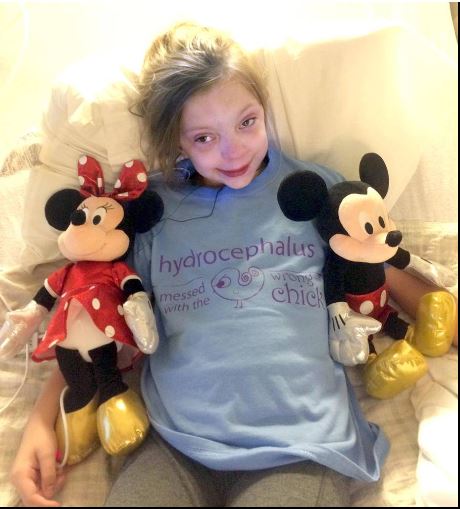
TOWN OF VERNON — This Friday, 7-year-old Westmoreland Elementary student Elyse Clough plans to address Congress, hoping to educate lawmakers on hydrocephalus and to seek their help in fighting it.
Elyse and her family left this morning for Washington, DC despite her emergency surgery last Saturday.
“She made it through, and she’s a real fighter,” Elyse’s father, Tom Clough, said. “And now we’re definitely heading out to speak on hydrocephalus.”
Elyse, who aspires to be a pediatrician, has been named National Ambassador of Hydrocephalus Awareness for 2016 by the Pediatric Hydrocephalus Foundation. On Friday she will join her parents and 23 other members of Research, Educate, and Cure Hydrocephalus, a DeWitt-based support group, to advocate for hydrocephalus research.
Hydrocephalus is a medical condition caused when an excess of fluid causes swelling and pressure on the brain. It has no known cure, and the only treatment is a shunt implant. A shunt is a soft silicone implant placed in the brain, then directed under the skin to the abdomen where excess fluid is drained and re-absorbed into the body.
Elyse received her seventh shunt after a seizure Friday evening.
“I was saying good night to my son, and as I passed her room I saw her hand shaking. I knew she was having a seizure, and we drove to Upstate University Hosptal (in Syracuse). We stayed there until Sunday afternoon,” Elyse’s father, Tom, said.
Elyse suffered the seizure at 10:30 that evening, and she underwent surgery 8:25 a.m. Saturday morning. After doctors confirmed the shunt was not infected and that Elyse was healthy she was released and sent home.
“The doctors ran some tests to be sure she is eating and drinking, that her eyes are clear and she is walking and using the bathroom,” Tom Clough said. “Because of the number of sick people in a hospital the risk of infection is lower at our home.”
On Friday morning Tyler Side, 11, of Washington state, will join her to represent boys battling hydrocephalus. They will then make a number of public and social media appearances during September, which PHF has designated as National Hydrocephalus Awareness Month.
But first she will enjoy some time visiting Washington and Virginia Beach.
“I am ready to stand before the people in suits and talk,” Elyse said. “Then I will go to the beach with my pail and shovel and play.”
Request for help
Elyse and other members of the delegation will stand before the country’s legislative branch to help advocate for continued education and research for her condition. Their goal is to have Bill H.R. 2313 passed into law.
If passed the Public Health Services Act would require the Centers for Disease Control and Prevention to expand its tracking of the epidemiology — the patterns, causes and effects — of hydrocephalus and use the information as part of a national database to spur research on the condition.
“We hope to accomplish more than we did last year,” Elyse’s mother, Kim Clough, said. “We’ve had good success with (U.S. Senator Charles) Schumer’s office, but we need to get this passed in the House of Representatives first before the Senate will consider it. We met with a representative’s staffer and all he did was stare at his pen and ignore what we said.”
An ongoing battle
PHF, which has chapters in 30 states, provides supports to families and also advocates with the medical and legal communities to help find a cure. Since 2010 they have given $375,000 in grants and donations towards research and education on the condition.
Research is needed because the relief provided by shunts is compromised by their frequent failure rate. Children have a shunt failure rate between 25 and 40 percent. Replacing a shunt is a complicated and potentially dangerous process. Elyse most recently had a shunt replaced in February.
“There are 40,000 shunt replacements a year, one every 15 minutes,” Tom Clough said.
Endoscopic third ventriculostomy, a shunt-free procedure where an incision at the bottom of enlarged ventricles allows fluid to drain, only works in two-thirds of patients.
Despite its myriad disorders hydrocephalus has a high survival rate. Several of the estimated 125,000 people suffering from have reached middle-age and older. “Some of these people will be coming with us this week,” Tom Clough said.
The Clough family remains proactive in supporting Elyse. Older brother Nathan supports his sister in school, and saves his allowance to help fund a cure. Tom Clough has organized the second fun run to raise money for Elyse. Information on the run and REACH’s mission may be found at www.reachorg.org
Hydrocephalus has over 180 different causes. They include birth defects, traumatic brain injury, infection, and overproduction or under-absorption of brain fluid. Symptoms include headaches, nausea and vomiting and sensitivity to light and flu-like pains. Elyse developed hydrocephalus after she was born premature, at 24 weeks.
Along with the risk of seizure, Elyse takes medication for her underdeveloped lungs (caused by her premature birth) and undergoes physical therapy, occupational therapy and speech therapy. She has trouble feeding herself anything besides finger foods. And she’s endured six shunt operations.
“This child could take up all of our time, but it is what it is,” Kim Clough said. “We know there has to be a better solution. If we can get political help then we will be closer to that solution.”
 Read more at: https://html.com/attributes/img-width/>
Read more at: https://html.com/attributes/img-width/>

























